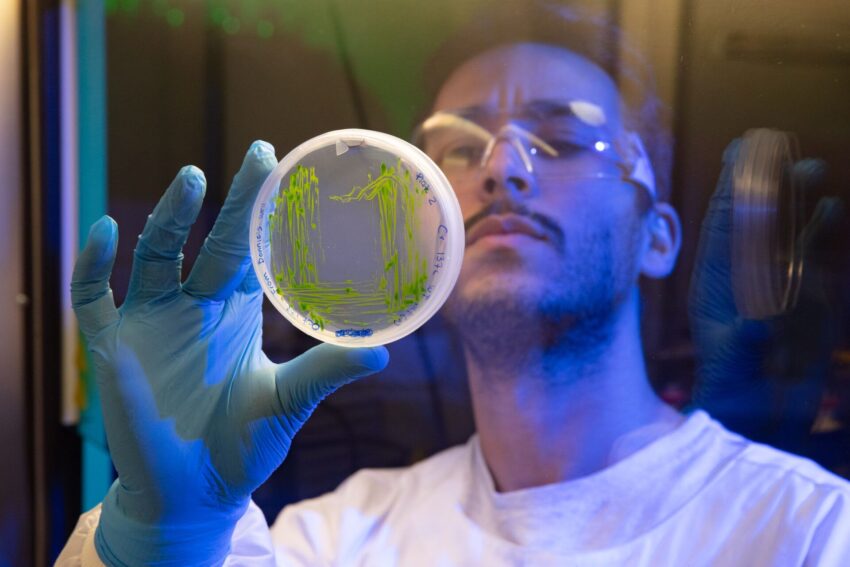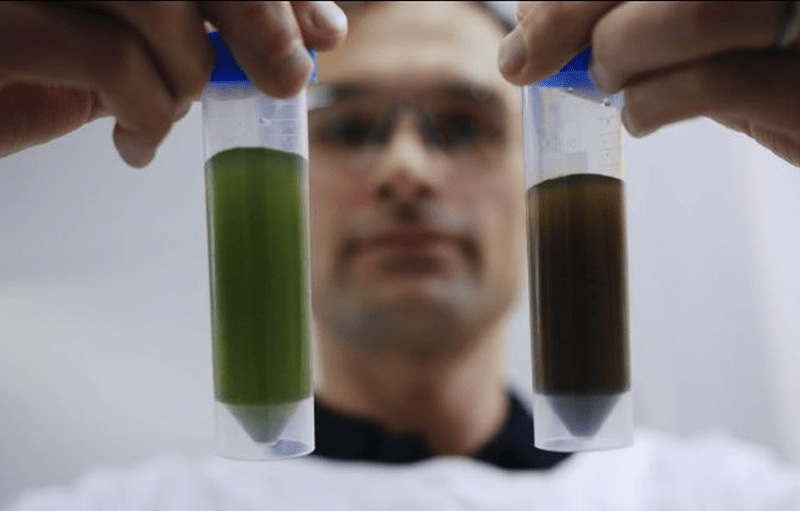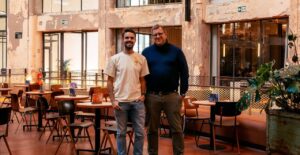Sugar-eating organisms such as yeast and bacteria dominate industrial fermentation today. But organisms that eat more sustainable feedstocks will be the “predominant biomanufacturing platforms of tomorrow” if we are serious about decarbonizing our supply chain, predicts Australian food and cosmetics ingredients startup Provectus Algae.
“Our feedstocks are light and carbon dioxide,” says founder and CEO Nusqe Spanton, who has developed a “carbon negative” growing platform he claims can unlock the potential of photosynthetic algae as a source of high-value ingredients.
“A 200,000-liter precision fermentation facility using Pichia [yeast] making 50 tons of product generates about 250-300 tons of carbon dioxide. Whereas our facilities are carbon negative,” claimed Spanton, who has just secured a strategic investment from CJ Bio, part of Korean biomanufacturing giant CJ CheilJedang.
“We pump air into our reactors and the microbes capture the carbon dioxide, convert it into carbon and release oxygen and clean water. We need lighting, but if facilities run on renewable energy, you’re looking at an extremely low cost of operating and a carbon negative positioning, which we must move towards if we want to decarbonize the supply chain.”
By contrast, yeast, fungi, and bacteria rely on sugar as a feedstock, an agricultural product with an environmental footprint that is also subject to pricing fluctuations that could make the economics of precision fermentation increasingly challenging, claimed Spanton.
And while they are great at making some things, yeast cells are not well equipped to produce some of the more complex molecules found in nature, which is prompting renewed interest in algae and plant cells, which have different internal machinery, he said.
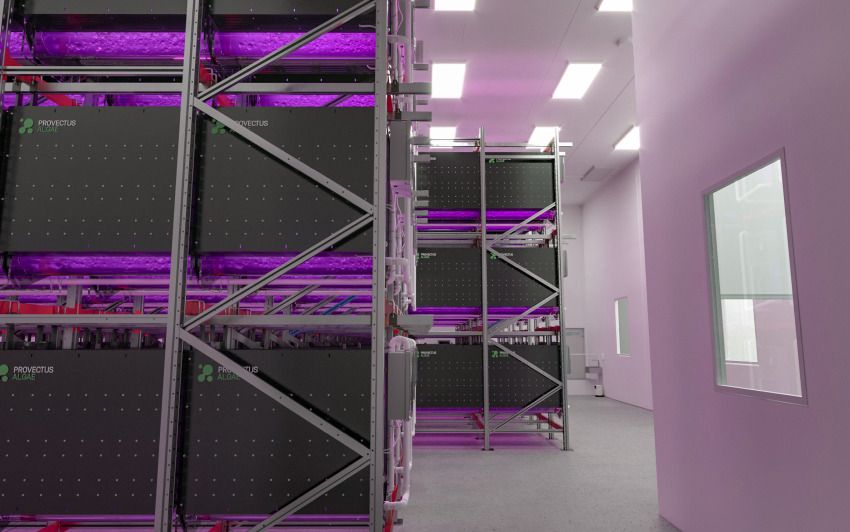
‘Our feedstocks are light and carbon dioxide’
But if it’s such a no-brainer, why isn’t everyone using algae as a biomanufacturing platform?
“Because it’s so hard to grow on an industrial scale without killing it,” said Spanton, who points out that of the 200,000+ algae species on Earth, just a handful have been grown commercially at scale.
One challenge is that algae is extremely particular about the light that it absorbs to grow, he said, noting that most species are photosynthetic, in that they require light—along with carbon dioxide and water— to produce organic compounds.
As algae grows very rapidly, meanwhile, it tends to block out its own light, while the kind of light that’s required to grow different algae species is vastly different, added Spanton, pointing out that algae can grow both on the surface of the ocean and at a depth of 500 meters.
“But these are problems we solved early on,” claimed Spanton, who is not competing with firms growing spirulina or astaxanthin in outdoor ponds, chlorella for protein, or Schizochytrium sp for omega 3 fatty acids. “We’re delivering products in algae that’s never been utilized commercially before.”
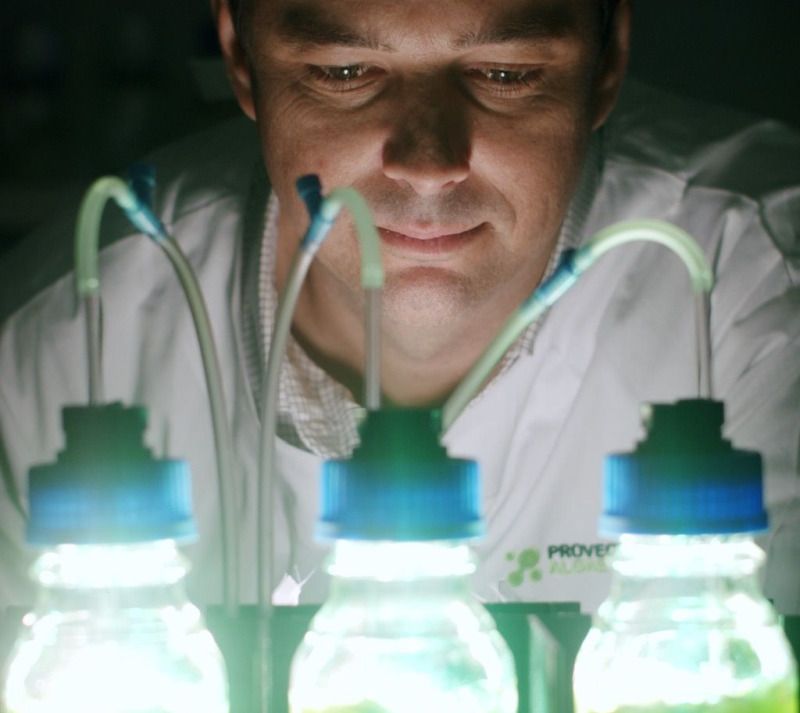
Provectus can deliver any type of light in the visible spectrum but also in the infrared and UV spectrum
So how does the technology work?
Provectus Algae has developed closed-system automated bioreactors growing photosynthetic algae at high densities with a series of LED lights.
According to Spanton, it’s a “scalable, modular, biomanufacturing platform that looks a bit like an Amazon warehouse with racking systems.”
Through its cloud-enabled, automated “self-optimizing” system, Provectus can deliver any type of light in the visible spectrum but also in the infrared and UV spectrum, manipulating the algae and pushing it down a metabolic pathway to increase the production of a target substance, explained Spanton.
In the first instance, it identifies algae species that naturally produce a given compound such as a pigment or fatty acid. Provectus exposes the algae to the right kind of light, which alters its DNA and improves its productivity.
However, it can also use synthetic biology techniques such as CRISPR to upregulate the production of a given substance or to produce products that don’t naturally occur in algae, said Spanton.
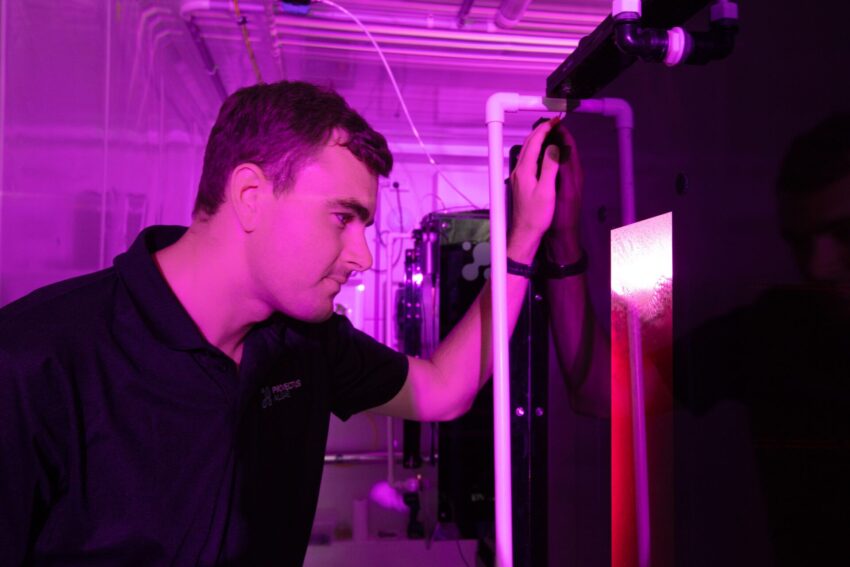
The business model and the deal with CJ Bio
Provectus Algae has two demonstration plants in Australia coming online this year and will introduce a non-GMO, red and natural colorant for meat alternatives that changes color when cooked, and new ingredients for the cosmetics market, said Spanton.
“Our production technology allows us to deliver a more stable red color at a price over the next two years that will be able to compete with beetroot powder. We’re expecting regulatory approvals this year in Australia, New Zealand, the US and potentially moving forward into Singapore next year. And then we’ll look at the European market.”
Longer-term, he said, “We’ll work with exclusive partners to develop high-performance products enabling companies to decarbonize their supply chains. That might be with existing products in their portfolio or new products they’re looking to develop in a carbon-negative way.
“CJ Bio can assist us in expanding manufacturing capacity and bringing products online.”
Provectus Algae has raised “about $19 million” to date from investors including Hitachi Ventures, Vectr Ventures, Possible Ventures, and Acequia Capital, he said.
